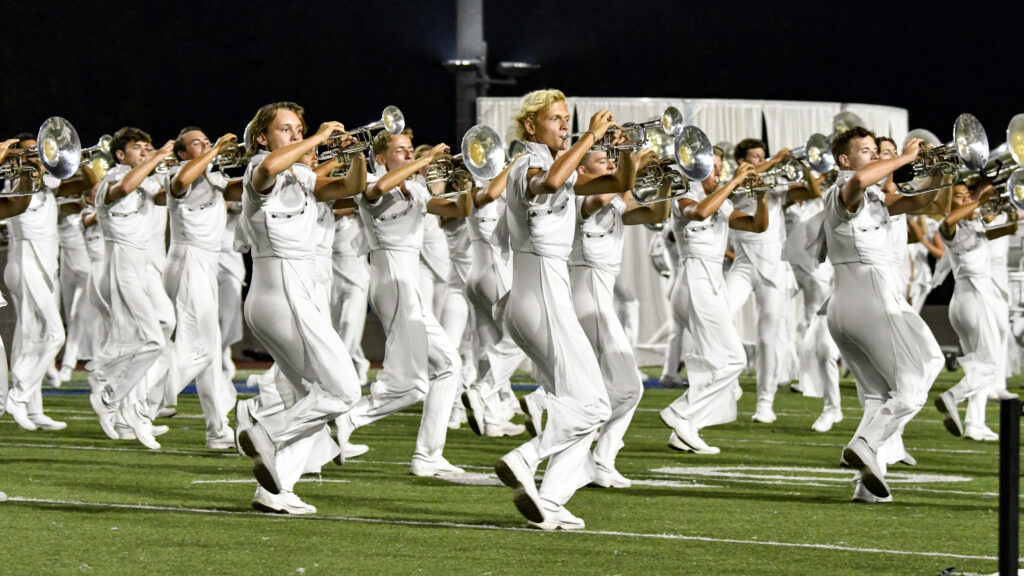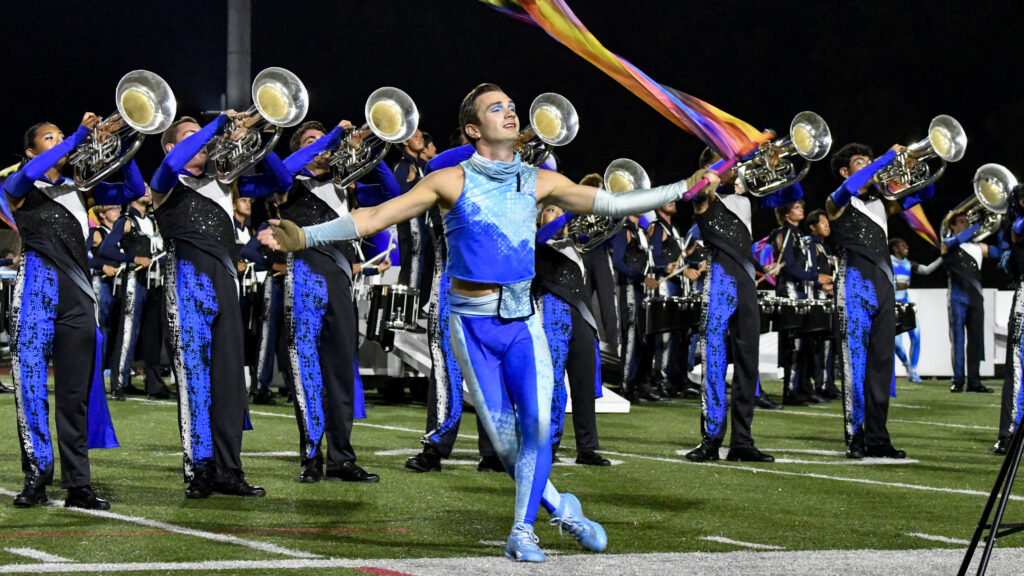In 1993, the Drum Corps International World Championships headed to Jackson, Mississippi, where the Cadets of Bergen County won their sixth title in 11 seasons.
While 1993 marked the final performance of Star of Indiana as a competitive drum corps, it marked a first for both the Glassmen and Colts who earned spots among the Top 12 finalist corps for the very first time.
In eighth place, Crossmen’s “Songs for the Planet Earth, Part II – A Celebration of Humanity” was the middle installment of a themed “Planet Earth” trilogy spanning 1992 to 1994. While the 1992 show dealt with the physical planet, the 1993 production explored the people who inhabit the spinning orb.

The 1992 show ended with a literal question mark drill formation about where the planet was heading. The 1993 show started with the same question mark but was disposed of as soon as the production started, to the opening strains of Aaron Copland’s “Fanfare for the Common Man.” Crossmen arrangers wove Copland’s most famous work throughout the show, sometimes quite subtly.
Uniforms of the corps proper featured white pants with black stripes down the sides. Black tops with a red sash featured the corps’ iconic Maltese cross in white on the front near the right shoulder. Color guard costumes were meant to represent the diversity of the skin colors of the peoples who inhabit the planet.
After the brief introduction, the show progressed into the jubilant “Journey Under the Sun” from the 1990 Paul Winter Consort album, “Earth: Voices of a Planet.” The album explored world fusion music, which combined elements of different cultures into its various selections. It’s a trademark of saxophonist Paul Winter, whose whole career has been based on celebrating the cultures and creatures of Earth.

The opener also included “Afro-Brasilia,” based on Full Circle’s “Myth America” from the group’s 1989 album of the same name. This second part of the opener expressed the joy of the Brazilian Carnivale as well as Afro-Brazilian drumming, showcased by five drummers playing Brazilian surdo drums.
Inspired by his first trip to Japan, Dave Brubeck’s “Koto Song” was originally written for the 1964 Dave Brubeck Quartet album, “Jazz Impressions of Japan.” The piece was one of his favorites, enough to record it 17 times. It celebrated Japanese culture with blues inspired by the 13-string Japanese zither. According to Brubeck’s own liner notes, the koto “seems to suggest the ethereal quality of Japan’s gardens and misty landscapes.”
The corps briefly formed “Tsuchi,” the Kanji character for “Earth,” and moved it five yards to the side while performing a slow section from one of Brubeck’s versions of the work.

Eugene Friesen’s serene “River Music,” from the 1989 album, “Arms Around You,” introduced the Crossmen selection titled, “Freedom.” Friesen, a cellist, was a longtime member of the Paul Winter Consort.
After that brief introduction, the work segued into “Freda” from the 1991 album “Greenhouse” by the jazz-fusion group Yellowjackets.
This segment of the piece celebrated American culture and, according to pre-season publicity materials, was conceived by the corps’ staff as representing a hoedown heard on the shore as a riverboat passed by. The piece, with the color guard members spinning cow-spotted flags, was likely the most jovial work on the field that year. A hint of “Fanfare for the Common Man” is heard toward the end.
The beginning of the Copland fanfare was more obvious during the elegiac start of “Anthem for Humanity,” based on Paul Halley’s “Anthem” and incorporating musical snippets from Crossmen’s production the year before.

The guard members now wore gowns of blue with green flashes, referencing Earth as seen from space. Spectacularly stunning is how spinning their giant silver lamé flags caught and reflected the colors of their costumes and the field surface, as if images of the Earth itself were bouncing off the lens of an orbiting telescope.
The show ended in the drill form of a lemniscate, the mathematical sideways figure eight symbol representing the concept of infinity. The message presented to those in the stands was that the future of Planet Earth looked bright, provided its people found strength in their similarities and their differences.
1993 Overview

Michael Boo was a member of the Cavaliers from 1975-1977. He wrote about the drum corps activity for more than 35 years while serving as a staff writer for various Drum Corps International projects. During his lifetime Boo wrote for numerous other publications including an honors-winning book on the history of figure skating. He also was an accomplished composer. Boo passed away in 2020 and was inducted into the DCI Hall of Fame posthumously in 2021.





